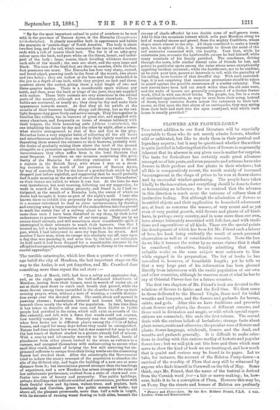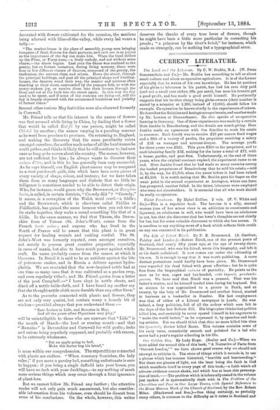FLOWERS AND FLOWER-LORE.* THIS recent addition to our floral literature
will be especially acceptable to those who do not merely admire flowers, whether wild or cultivated, but like to study them in their poetical and legendary aspects ; but it may be questioned whether the author is quite justified in believing that the love of flowers is so generally inherent that its absence in any given case is matter for surprise. The taste for floriculture has certainly made great advances amongst us of late years, and even peasants and artisans have nice flowers in their gardens and fine plants in their windows ; but all this is comparatively recent, the result mainly of increased encouragement in the shape of prizes to be won at flower-shows and by successful window-gardening. The people have taken kindly to the innovation, and everything should be done to foster so humanising an influence ; for we contend that the advance in this direction is much more the outcome of culture than of instinctive feeling. But although the admiration of flowers as beautiful objects and their application to household adornment are, at least as concerns the masses, of very recent and as yet even of very partial growth, wild flowers and plants of all kinds have, in perhaps every country, and in none more than our own, been always intimately associated with folk-lore, and with tradi- tions and superstitions of all kinds. These are the special points the development of which has been for Mr. Friend such a labour of love, his book being evidently the result of much personal observation as well as of considerable research. None the less do we like it because the writer by no means claims that it shall be considered, exhaustive, frankly admitting that some valuable works on the same subject were unknown to him while engaged in its preparation. The list of books he has consulted is, however, of formidable length ; yet he tells us that a very large part of his information has been gleaned directly from intercourse with the rustic population of our own and other countries, although he reserves most of what he has to say of Oriental Flower-lore for a future occasion.
The first two chapters of Mr. Friend's book are devoted to the relations of flowers to fairies and the Evil One. We then come to those dedicated to the Blessed Virgin, those used for bridal wreaths and bouquets, and the flowers and garlands for heroes, saints, and gods. After this we have traditions and proverbs about flowers and plants, the flowers of different seasons, and those used iu divination and magic, or with which special super- stitions are connected ; this ends the first volume. The second deals with the curious beliefs of herbalists; strange facts about
plant- names, rustic and otherwise; the peculiar uses of flowers and plants, flower-language, witchcraft, flowers and the dead, and wreaths and garlands generally. It is difficult to make selec- tions in dealing with this curious medley of historic and popular flower-lore ; but we will pick out bits here and there which may serve to show the kind of book we are treating of, and bow much that is quaint and curious may be found in its pages. Let us take, for instance, the account of the Helston Furry-dance—a survival of the worship of Flora that may still be witnessed by anyone who finds himself in Cornwall on the 8th of May. Some think, says Mr. Friend, that the name of the festival is derived from the Cornish word fuer =a fair or merry-making ; he, how- ever, holds it to be a corruption of Flora. However this may be, on Fr_rry Day the streets and houses of Helston are profusely
* Flowers and Flower-Lore. By the ItIv. Hilderic Friend, F.L.S. 2 vols. London : Swan and Sonnenschein.
decorated with flowers cultivated for the occasion, the maidens being adorned with lilies-of-the-valley, while every lad wears a tulip :—
" The market-house is the place of assembly, young men bringing bouquets of fresh flowers for their partners, and each one is as joyous as the importance of the day can make him. When the band strikes up the Flora, or Farry-tune,—a lively melody, and not without some charm,—the dance begins. Last year the dance was confined to the gentry, but on former occasions, during living memory, there were four or five different classes of dancers, composed of the gentry, the tradesmen, the servant class, and others. Down the street, through the principal buildings, and past all the principal shops and dwelling. houses, the dancers wend their way, the master and mistress often standing at their doors, surrounded by the younger folk, to wish the merry-makers joy, or receive them into their houses, through the front and out at the back into the street again. In this way the day used to be spent, and if some of the customs are dying out, still the day is largely observed with the accustomed heartiness and joviality of former times."
Several other curious May festivities were also observed formerly in Cornwall.
Mr. Friend tells us that his interest in the names of flowers was first aroused while living in China, by finding that a flower
that would be called Kai fa by one person, might be called Chi-tsci by another ; the names varying in a puzzling manner
as he went from province to province. On returning to England, and making the discovery that the same peculiarity exists amongst ourselves, the author made notes of all the local names he could gather, and thinks it likely that he will continue to find new
ones as long as he moves about the country. The names, however, are not sufficient for him ; he always wants to discover their raison ti'f. tre, and in this he has generally been very successful. As he says himself, our English plant-names may be compared to a vast patchwork quilt, into which have been sewn pieces of every variety of shape, colour, and texture ; for we have taken them from so many languages and dialects that no little in- telligence is sometimes needed to be able to detect their origin. Who, for instance, would guess why the Brownwort, or Scrophu- laria, is called, in certain districts, " Crowdy-Kit " ? " Crowdy," it seems, is a corruption of the Welsh word crwth=a fiddle ; and the Brownwort, which is elsewhere called Fiddles or Fiddlestick, has gained the name because when you rub two of
its stalks together, they make a sound something like that of a fiddle. In the same manner, we find that Titsum, the Devon- shire form of Tutsan (St. John's-Wort), comes from the
French touts same; and anyone who has lived in the South of France will be aware that this plant is in great request for healing wounds and making cordial. The St. John's-Wort was formerly reputed, even amongst ourselves, not merely to possess great curative properties, especially in cases of mania, but also to have much power against witch- craft. Its name probably comes from the season at which it blossoms. In Brazil it is said to be an antidote against the bite
of poisonous snakes, and in Russia a defence against hydro- phobia. We are reminded that the now-despised nettle had at one time so many uses that it was cultivated as a garden crop, and even regularly tithed ; and Mr. Friend quotes from a letter of the poet Campbell :—" I have slept in nettle sheets, and dined off a nettle table-cloth, and I have heard my mother say that she thought nettle-cloth more durable than any other linen."
As to the proverbs connected with plants and flowers, they are not only very quaint, but contain many a homely bit of wisdom—provided always that you understand them :—
" Eate Leekes in Lide, and Remains in May,
And all the yeare after Physitians may play,"
will be unintelligible to those who are unaware that "Lide" is the month of March—the loud or roaring month—and that " Ramsins " is Devonshire and Cornwall for wild garlic ; leeks and onions being popularly supposed, and probably with reason, to be extremely wholesome.
"Eat an apple going to bed, Make the doctor beg his bread,"
is more within our comprehension. The snperstitions connected with plants are endless. "When rosemary flourishes, the lady rules ;" if you move a parsley bed, something unfortunate is sure to happen ; if you bring a single daffodil into your house, you will have no luck with your ducklings,—to say nothing of mach more serious things which may occur through a fatal ignorance of plant-lore.
But we cannot follow Mr. Friend any further ; the attentive reader will not only gain much amusement, but also consider- able information from his volumes, even should he dissent from some of his conclusions. On the whole, however, this writer
deserves the thanks of every true lover of flowers, though he might have been a little more particular in correcting his proofs ; "a primrose by the river's brink," for instance, which reads so strangely, can be nothing but a typographical error.



































 Previous page
Previous page